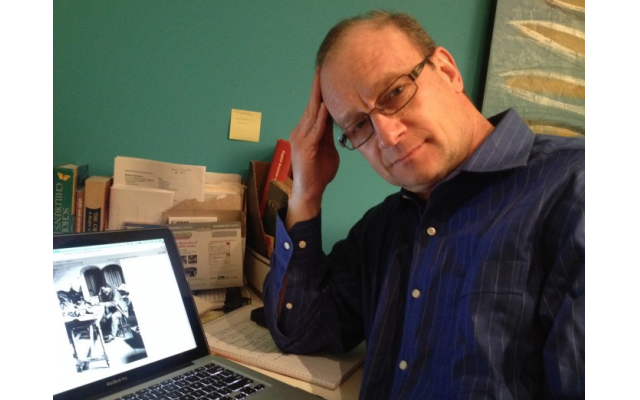After Pittsburgh, Are You Comfortable Here?
A friend's question prompts a consideration of a Jew's place in America.
Dave Schechter is a veteran journalist whose career includes writing and producing reports from Israel and elsewhere in the Middle East.
My friend asked, “Do you feel comfortable here?”
By “here,” he meant the United States.
In the eight days since the Pittsburgh synagogue massacre, I had written several articles and columns reacting to the tragedy, so my first response was to answer as a Jewish American.
Self-identifying as a Jewish American is a slightly different mindset than being an American Jew (a matter of which word is the noun and which the adjective).
Nonetheless, my first reaction was as a Jew.
My friend, an ex-pat Brit who has lived in this country for 25 years, understands the feeling of being part of a whole while feeling separate.
He asked the question during our regular Monday lunch at a popular spot in our neighborhood. We usually begins with a discussion of the weekend’s soccer games and then move into politics, economics, and other topics.
Yes, I replied, I do feel comfortable in this country, but I understand how the slaughter of 11 innocent worshippers would cause any American Jew to pause before answering.
I am comfortable but by no means pollyannish.
The killings in Pittsburgh were the result of unbridled hatred of Jews because they were Jews.
Non-Jews cannot be expected to understand that feeling in the pit of the stomach Jews felt when they heard of the slaughter inside the Tree of Life synagogue.
Fourteen months earlier, Jews were unnerved by the neo-Nazi march and rally in Charlottesville, Virginia.
Bookended, Pittsburgh and Charlottesville were reminders that Jews, while part of the American whole, also are separate – sometimes in their own minds, always in the minds of those consumed by hate.
Just in time for this column, the Federal Bureau of Investigation recently released its 2017 hate crimes report, which is based on information provided by local and state police agencies.
Religion was the motivating factor in 20 percent of the offenses.
Jews – who are 2.3 percent of the population – were the target in 58.1 percent of those offenses. (Muslims were the targets in 18.7 percent.)
Of the offenses targeting Jews, 41.4 percent involved “destruction/damage/vandalism,” 18.3 percent were acts of intimidation, and 6.2 percent were classified as simple assault.
There were zero anti-Jewish murders in the FBI’s 2017 report.
There will be at least 11 in its 2018 report.
One response to Charlottesville, Pittsburgh and such statistics is to think of America as being on the verge of the calamity that befell Germany in the 1930s, and have a suitcase packed, at least figuratively (though some may admit to making arrangements to leave).
The other is to assert one’s Jewish identity, as thousands did in Atlanta by attending vigils and memorial services after the Tree of Life tragedy, and by resolving to live Jewish lives (as individually defined) publicly, not hiding or retreating.
Support for such intention can be drawn from the significant number of non-Jewish friends and allies who stood with Atlanta’s Jewish community at these events in the week after Pittsburgh and such gestures as students at the Marist School writing hundreds of letters of condolence to their peers and staff at the Weber School.
American children once were taught that this country is a melting pot, a nation in which identities – of race, religion, ethnicity, and culture – were subsumed by a broader American identity.
In the past 40-50 years, that notion has been replaced by recognition that America is a mosaic, its pieces held together by a common bond, the idea of America.
I think of the nation’s motto – e pluribus unum; out of many, one – in terms of that mosaic.
Despite the demagoguery heard from some quarters, America’s strength lies in citizens maintaining their unique cultures while also striving to achieve an ideal, albeit one that continues to evolve.
Jews are a vibrant part of this mosaic.
Jewish life in America has not always been comfortable.
But even with the lure of a modern Jewish homeland, and even as current events test the communal mettle, American Jews continue to nurture the family tree planted in this soil nearly 400 years ago.




comments